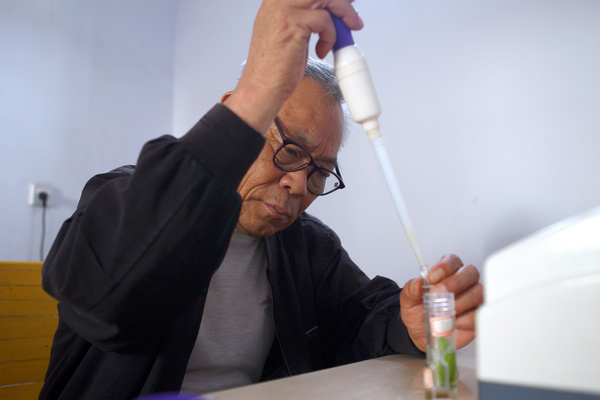 |
|
A tester checks a Nanfan cucumber for chemical residue. According to protocols, he should be wearing gloves. [Photos by Zou Hong / China Daily] |
Daily tests
Shouguang, in Shandong, is the "vegetable city" of China. About 60 percent of its cultivated land is devoted to growing vegetables, and it produces about 4 billion kg of them each year.
It also has taken the lead in promoting safer farming by cracking down when tests show that residues of farm chemicals exceed 50 percent. Levels above that amount indicate that either too much was used or the chemicals were applied too close to harvest.
"Almost all villages in Shouguang have a testing office and technicians will do the test every day," said Fan Quande, the Nanfan village chief. "If any hypertoxic chemicals are found on vegetables, the whole plastic greenhouse should be destroyed and farmers who grow those vegetables will be detained."
In fact, he said, 10 greenhouses were destroyed and six farmers in the village were punished in the past two or three years.
Nanfan village has about 400 families and each owns a greenhouse that covers about 1,000 square meters. Fan Jiude, 46, grows cucumbers that bring his family 40,000 to 50,000 yuan a year, he said.
"In recent years, no highly toxic pesticides have been sold in the market and we dare not use them because of the severe punishment," he said.
Fan, who has grown vegetables for more than 25 years, knows about other risks. "The hypertoxic pesticides are so strong that once I was poisoned in the greenhouse, just because I wiped away sweat after spraying without washing my hands. It made me throw up and I stayed in a hospital for three days."
According to the most recent statistics available from the Ministry of Health, more than 17,000 pesticide poisoning cases in rural areas were reported in 2000, and more than 1,000 people died. About a quarter of the poisoning cases happened during farmwork.
Leak in the system
In Fan Jiude's greenhouse, some small plastic bags lay on the ground, empty containers for chemical fertilizer he uses to make his cucumbers grow larger. The instructions on the back of the bag said the contents should be diluted 1:15 - one part fertilizer to 15 parts water. Fan said he uses only 10 parts water.
In the village's agricultural testing office, the man conducting the tests is supposed to wear gloves and use tweezers when he cuts rind from a cucumber to test for chemical residue. He had neither but, when prodded by the village chief, used scissors instead of tweezers. But he said he does wash containers after each sample is tested and uses distilled water - both parts of the protocol - so the results can be trusted.
"That's where the problem is," said Jiang, the botany researcher. "Public sectors are speeding up to build a safe system, but the effect still lags behind. It takes time to educate farmers and to run the system well in the grassroots units."
Sun Jingbo and Wang Jing contributed to this report.
